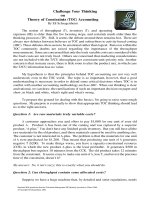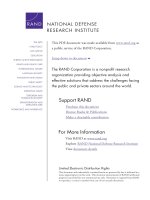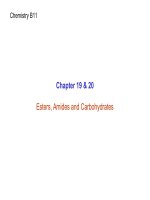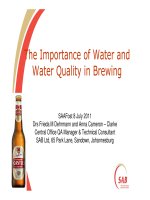Numerical problem on hardness of water
Bạn đang xem bản rút gọn của tài liệu. Xem và tải ngay bản đầy đủ của tài liệu tại đây (110.54 KB, 12 trang )
Numerical Problem on hardness of
water
• A water sample has the following analysis:
Mg(HCO3)2 = 83mg/l, Ca(HCO3)2 = 134
mg/l, CaSO4 = 124mg/l, MgCl2 = 84mg/l,
CaCl2 = 94mg/l, NaCl = 50mg/l. Calculate
the temporary and permanent hardness in
ppm and in degree Clark.
Solution
Calculation in terms of
CaCO3
equivalent
Constituent
Quantity
mg/l
Multiplication
factor
CaCO3 equivalent
mg/l
Mg(HCO3)2
Ca(HCO3)2
CaSO4
MgCl2
CaCl2
NaCl
83
134
124
84
94
50
100/146
100/162
100/136
100/95
100/111
Does not produce
hardness
56.8
82.7
91.2
88.4
84.7
---------
• Temporary hardness = hardness due to Ca(HCO3)2 and
Mg(HCO3)2
= 139.5 mg/l = 139.5 ppm = 139.5 x 0.07 °Cl = 9.77 °Cl
• Permanent Hardness = hardness due to CaSO4 + MgCl2
+ CaCl2
= 264.3mg/l = 264.3 ppm = 264.3 x 0.07 °Cl = 18.50
°Cl
Boilers feed water
• Water required for boiler feed purposes should
be of very high quality and requires a lot of
treatment. If the hard water is fed directly into
the boilers then huge damage is caused to the
boilers. Hard water in boilers lead to:
•
•
•
•
1)
2)
3)
4)
Scale and Sludge formation.
Priming and Foaming
Boiler corrosion
Caustic embrittlement.
Scales and sludge formation
Sludges
Scales
Priming and Foaming
• Priming refers to the propulsion of water
into the steam drum by extremely rapid
almost explosive boiling of the water at
the heating surface,
• Foaming is the formation of bubbles at the
water surface in the boilers due to the
presence of oils and alkalis in the boiler
feed water.
Boiler Corrosion
• It is actually the decay or disintegration of
boiler material either due to chemical or
electrochemical reaction with its
environment having O2, CO2 and mineral
acids.
Disadvantages of boiler corrosion
1. Shortening of boiler life
2. Leakages of joints and rivets
3. Increased cost of repairs and
maintenance.
Caustic embrittlement
• This is the phenomenon during which the
boiler material becomes brittle due to the
accumulation of caustic substances.
• This is caused by the use of highly alkaline
water in the high pressure boiler.
Water softening Techniques
•
•
•
•
Lime soda Process
Zeolite softening process
Ion exchange process
Mixed bed ionexchangers
Equations involved in the lime soda process
Reactions with lime
• Removal of temporary hardness using lime Ca(OH)2
• Ca(HCO3)2 +Ca(OH)2 = 2 CaCO3 +2 H2O
• Mg(HCO3)2 +Ca(OH)2 = CaCO3 +2H2O+ MgCO3
• MgCO3 +Ca(OH)2 = CaCO3 + Mg(OH)2
• Removal of permanent Mg hardness
• MgSO4 +Ca(OH)2 = CaSO4 + Mg(OH)2
• MgCl2 +Ca(OH)2 = CaCl2 + Mg(OH)2
• Removal of dissolved iron and aluminium salts
• FeSO4 +Ca(OH)2 = CaSO4 + Fe(OH)2
• 2Fe(OH)2 + H2O +1/2 O2 = 2Fe(OH)3
• Al2(SO4 )3+3Ca(OH)2 = 3CaSO4 +2 Al(OH)3
• Removal of dissolved CO2 and H2S
• CO2 +Ca(OH)2 = CaCO3 +H2O
• H2S +Ca(OH)2 = CaS +2 H2O
• Removal of free mineral acids
• 2HCl +Ca(OH)2 = CaCl2 + 2 H2O
• H2SO4 + Ca(OH)2 = CaSO4 + 2 H2O
Reactions with soda
• CaCl2 + Na2CO3 = 2NaCl + CaCO3
• CaSO4 + Na2CO3 = Na2SO4 + CaCO3
• Advantages of Lime Soda Process
•
•
•
•
•
It is economical
It helps in removing iron and manganese from the water
This treatment helps in removing total mineral content of water.
The increased alkalinity of the water helps in killing pathogenic bacteria
The pH value of water increased by thus process reducing the corrosion of
the distribution pipes.
• Disadvantages of lime soda process
• As CaCO3 is slightly soluble in water it is not possible to remove complete
•
•
hardness by this process
Careful operation and skilled supervision is required to get good results
A large quantity of sludge is formed by this process the disposal of the
sludge is a problem.









